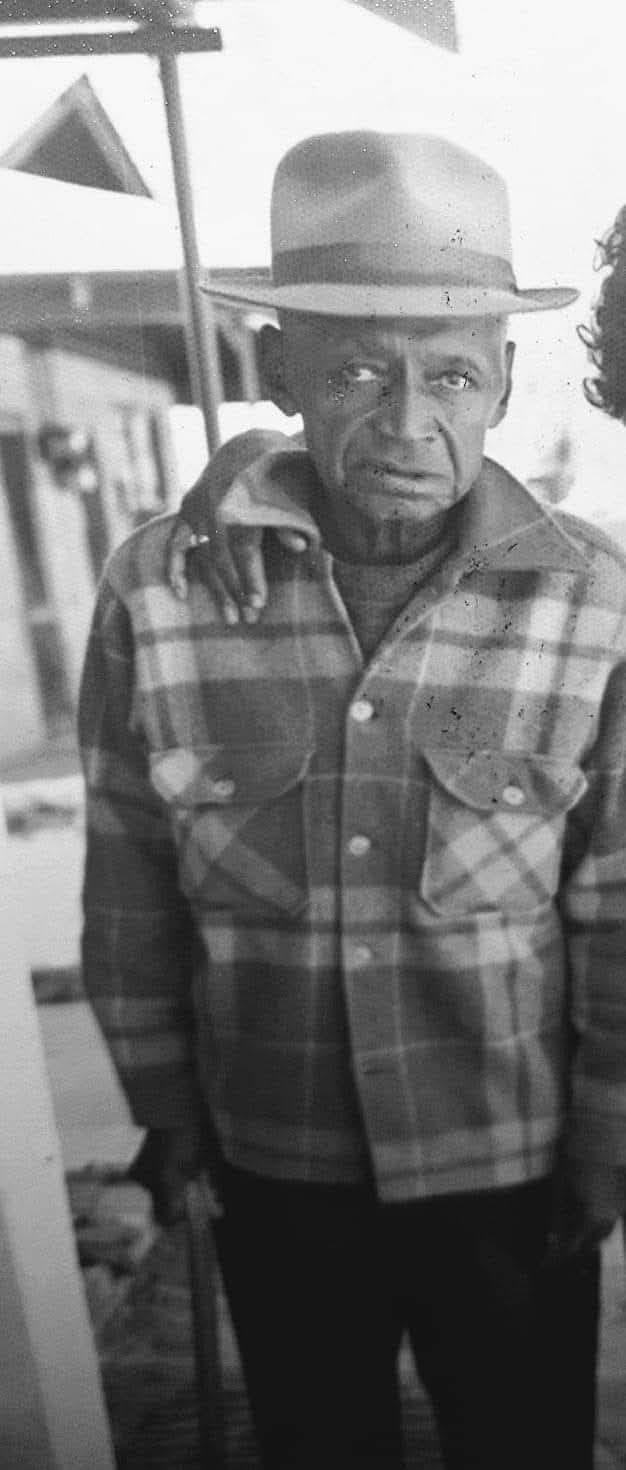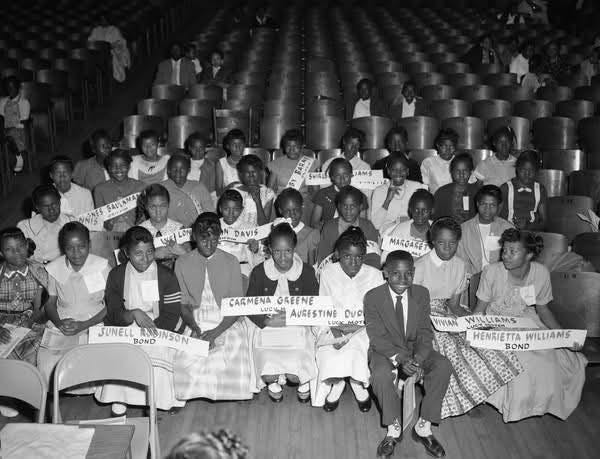The historian in me has always recognized the blessing of knowing my maternal Great Grandparents, Charlie and Irene “Sweetie” Williams, of Camilla, Georgia. Both were born in 1884 to formerly enslaved parents and died within a year of each other in 1981-82, just long enough for me to spend time watching, listening, and observing their habits when my family came south for visits prior to 1980, and finally moved to Florida for good that same year.
My “Pa” Charlie was a farmer, a sharecropper to be exact, who worked the vast cotton plantation owned by a white man named Virgil Holton.
Charlie L. Williams, age 95, circa 1979
Grandma Sweetie was a domestic worker for the Holton family and in time her children, Charlie Ed (born in 1918) and Helen (b. 1924), became a farmer and domestic worker, too.
On the left is my Great Grandma Irene “Sweetie” Williams, 95, and her daughter, my Grandma Helen Williams (Huntley), 55, circa ‘79
My Williams family ancestors were no different than most Americans of all races during that era; per the 1920 Census, 30.2 percent of the population reported their occupations as farmers or in farming related industries. In contrast, 100 years later, per the 2020 Census, fewer than 2 percent of Americans work in farming.
Much of what I know about my maternal ancestors comes directly from my mother, Vivian, who was born in Camilla but was raised in Tallahassee, Florida, which is about an hour to the south. Due to recent political and social events in our nation, my Mom has been talking quite a bit about growing up during Jim Crow, including the long hours that our male Williams family members spent planting and picking cotton, and the condescending attitudes that the Williams women experienced from the white Holton family women, and the “too familiar,” flirtatious glares from the Holton men who owned the land our ancestors farmed—and the homes that they lived in west of downtown Camilla.
To further clarify her contempt for those times, Mom reminds that Camilla was so rigidly segregated that when she was in grade school, she remembers that a biracial teenager who had died in a drowning incident was buried in his family's plot in the white cemetery, but was soon exhumed and reburied in the Black cemetery further down the street after local white citizens became enraged by the break in long established social customs!
But what also stands out is when my mother reminds me that public education, while mandatory by the time she started school in the late 1940's, wasn't compulsory in many parts of the South after a child reached 8th grade. Most rural boys spent far more time time in the fields than a classroom, but even that was an advance upon her own mother and grandparents' generations where there were few to no public schools to attend—period!
My mother, Vivian Williams Hobbs (front row, second from the right), was a 7th grade student at Lucy Moten Elementary (FAMU High) in 1955 during the segregated spelling bee. She is flanked by her cousin, Henrietta Williams Holmes (RIP), and to the left by Aurestine Dupont Higgs, mother of my FAMU High classmate and old friend, C. Fred Higgs, III. Note that the majority of participants were Black girls—not boys!
The same holds true for health care, as the majority of Americans living in rural areas had no local hospitals or clinics during the Jim Crow era. Women had no access to prenatal care and bore their children at home with little to no trained medical professionals; men's health care maintenance was often a nullity as well, which is one reason why so many rural families buried a number of their children who died prematurely, and many of their husbands, fathers, and brothers who died from untreated diseases and exhaustion well before their 60th birthdays.
For a decade, I have mocked President Donald Trump's "Make America Great Again" slogan by reminding that for many millions of Americans, especially the descendants of the enslaved and Jim Crow sufferers like my family, America was never all that great! Many of my friends of Hispanic, Native, and Asian descent have their own horror stories that were passed down about how their ancestors suffered mightily under the yoke of systemic racism as promulgated by wealthy white power brokers in these United States.
And to ensure that no one can dismiss my averment as imbalanced, America wasn't all that great for poor whites who struggled to make ends meet as well! But the difference is that many poor whites, whether Christian or Jewish, Southern European or from the North, tended to hold out hope that the "American Dream" would eventually see their financial and social statuses rise. Which, for many, it did due to New Deal, GI Bill, Medicare and yes, Medicaid programs that largely benefited far more whites than any other races throughout the mid to late 20th Century.
Which is why it makes zero sense to me that so many middle to lower class whites have flocked to Trump's MAGA movement, one that is gutting large parts of the social safety net that for years, has educated, medicated, and employed them at higher rates than all other people? What's not odd is that Donald Trump, a child of extreme wealth, has charted a path that shifts even more wealth into the hands of his fellow oligarchs!
You see, conservatives have never hidden their disdain for public education, which is why the attacks on institutions and funding via student loans and grants are just beginning because eliminating educational opportunities not only helps the highly educated elite to stay elite, but also helps to push American workers “back to the rural future!” Clearly, those who lack the skills to advance in the modern technological world will be pushed towards filling the farm and hard labor jobs that are being abandoned by immigrant workers who are being deported in massive numbers by the president's ICE enforcers. Sadly, too many folks who should be alarmed have yet to realize how very dangerous Trump's vision is for the 68 percent of Americans who didn't vote for him—or didn't bother to vote at all!








Again, you communicate with your audience with facts and clarity. Thank you!
Brilliant piece.